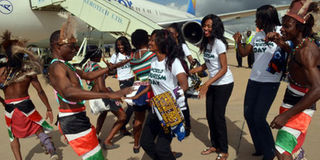Sh7bn set aside to market Kenya and revive tourism

Members of the Bombolulu Cultural dance with Miss Tourism Finalists for Mombasa County in a jig to mark the World Tourism day at the Moi International Airport on September 27,2014. Hotels and lodges have welcomed the allocation of Sh7.1 billion to boost the industry’s recovery campaigns. PHOTO | KEVIN ODIT | NATION MEDIA GROUP
What you need to know:
- Increased spending in marketing Kenya as an attractive tourism destination is expected to woo more tourists to visit and reverse the decline that has also hurt the fortunes of local airlines.
- Terrorist attacks, travel advisories by European governments and the spread of Ebola in West African nations were blamed by the government for the decline last year.
- Mr Mohammed Hersi, a veteran Kenyan hotelier told Reuters last month that some of the workers and managers at the luxury Heritage Group hotels chain had recently taken pay cuts of between 20 and 30 per cent to avoid layoffs during the slump.
The marketing budget for ailing tourism has been increased six-fold to Sh7.1 billion as Kenya prepares to battle the effects of travel alerts that have crippled the industry.
This will be Sh6 billion more than the Sh1.1 billion allocated in the current financial year.
The increase comes after earnings fell by 7.3 per cent last year due to a decline in tourists. The decline was blamed on terrorist attacks, in parts of the Coast, which is popular with tourists.
The decline in earnings, combined with the slow growth in agriculture and manufacturing contributed to the slow down of economic growth from last year, according to the Economic Survey published earlier this month.
Increased spending in marketing Kenya as an attractive tourism destination is expected to woo more tourists to visit and reverse the decline that has also hurt the fortunes of local airlines.
This allocation is expected to calm the nerves of hoteliers who have accused the government of doing little. Tourism employs about 150,000 people.
Terrorist attacks, travel advisories by European governments and the spread of Ebola in West African nations were blamed by the government for the decline last year.
Britain, the US, France and Australia last May issued travel warnings against visiting some parts of the Coast. This led to a decline in tourists and the closure of more than 40 hotels at the Coast. The countries have since lifted or revised the advisories.
Mr Mohammed Hersi, a veteran Kenyan hotelier told Reuters last month that some of the workers and managers at the luxury Heritage Group hotels chain had recently taken pay cuts of between 20 and 30 per cent to avoid layoffs during the slump.
“It seems we might have to go further and lay off staff, because we may not sustain even this reduced wage bill,” he said. The Heritage Group is owned by the Kenyatta family.





